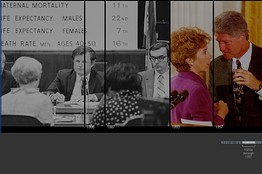By LOUISE RADNOFSKY
The Supreme Court said Congress was acting within its powers under the Constitution when it required most Americans to carry health insurance or pay a penalty. It upheld the mandate as a tax, in an opinion by Chief Justice John Roberts.
But the justices found fault with part of the health-care law's expansion of Medicaid, a joint federal-state insurance program for the poor. The justices gave states the option of sitting out the law's Medicaid expansion without losing existing funding for the program.
Q: Does this mean the health-overhaul law is in place for good?
A: The decision effectively upholds the law for now, but its future depends on which party controls the White House and Congress after elections in November. President Barack Obama and most Democrats consider the law a signature achievement and want to move forward implementing it. Republicans, including presumptive presidential nominee Mitt Romney, have pledged to overturn it. They say they would offer an alternative proposal but haven't been specific about what it would include.
Photos
Timeline: The Health-Care Debate
Read a timeline of events surrounding President Barack Obama's health-care legislation, from the bill's path through Congress to the legal challenges.
Looking Back: Health Care in America
Read about past efforts to change how Americans receive and pay for health care.
Q: What happens to any benefits I already get because of the law?
A: They will stay in place for now. Parents will still be able to keep their children on their insurance plans up to age 26, and Medicare recipients will keep getting discounts on prescription drugs to close a gap in coverage known as the "doughnut hole." New levies under the law, such as the 10% tax on tanning services, also stay put.
Q: When will I see the big changes from the law?
A: Most of the mandates don't start until 2014. That is when most Americans will be required to carry insurance or pay the penalty at issue in the Supreme Court case. The penalty will start at $95 a year or up to 1% of a person's income, whichever is greater.
Tens of millions of Americans are expected to get insurance coverage under the system that starts in 2014. But fewer people may end up getting covered because the court made it easier for states to opt out of the law's Medicaid expansion. Another batch of people who earn more but still have low incomes will get tax credits to offset their insurance costs. Consumers will be able to comparison shop for policies in newly created exchanges that will operate like popular online travel websites.
Insurance companies will have to sell coverage to everyone, regardless of their medical history, and will have to restrict how much they vary premiums based on age. Companies with 50 workers or more will be required to offer insurance to their workers or pay a penalty.
Q: What if I already have insurance?
A: You may see changes to your plan. Unless your employer has "grandfathered" your insurance benefits' structure, your plan will have to meet new regulations under the law, such as covering more preventive services without out-of-pocket costs. There has been speculation that some employers will stop offering coverage and funnel workers toward exchanges once they open, but most companies say they have no immediate plans to do that.
Q: What will happen to my insurance premiums?
A: Most consumers can expect to keep seeing increases in premiums and co-payments because the underlying cost of health care is expected to rise. The law contains a few mechanisms to curb premiums, but it also requires that many insurance providers make their benefits more generous, which will raise their cost. Older people could see their premiums go down because of the new age rating rules insurers will face. People who buy policies without the help of an employer could get a better deal by being able to shop on the exchanges, where comparing plans will be easier than before.
Write to Louise Radnofsky at louise.radnofsky@wsj.com





![[image]](https://iza-server.uibk.ac.at/pywb/dilimag/20210113092156im_/http://si.wsj.net/public/resources/images/OB-TO234_0628hc_F_20120628105159.jpg) Associated Press
Associated Press

![[SB10001424052702304058404577494453634974844]](https://iza-server.uibk.ac.at/pywb/dilimag/20210113092156im_/http://s.wsj.net/public/resources/images/OB-TO193_0628sc_D_20120628092753.jpg)






![[image]](https://iza-server.uibk.ac.at/pywb/dilimag/20210113092156im_/http://si.wsj.net/public/resources/images/OB-TL548_0621sc_A_20120620173018.jpg)
![[image]](https://iza-server.uibk.ac.at/pywb/dilimag/20210113092156im_/http://si.wsj.net/public/resources/images/OB-TO169_1schae_A_20120628072602.jpg)
![[image]](https://iza-server.uibk.ac.at/pywb/dilimag/20210113092156im_/http://si.wsj.net/public/resources/images/OB-TO142_turksy_A_20120628045529.jpg)
![[image]](https://iza-server.uibk.ac.at/pywb/dilimag/20210113092156im_/http://si.wsj.net/public/resources/images/MI-BP788A_MKTLE_C_20120628153938.jpg)
![[image]](https://iza-server.uibk.ac.at/pywb/dilimag/20210113092156im_/http://si.wsj.net/public/resources/images/OB-TO479_0628to_C_20120628161535.jpg)
![[image]](https://iza-server.uibk.ac.at/pywb/dilimag/20210113092156im_/http://si.wsj.net/public/resources/images/OB-TO098_midsea_C_20120628002928.jpg)
![[image]](https://iza-server.uibk.ac.at/pywb/dilimag/20210113092156im_/http://si.wsj.net/public/resources/images/PJ-BI172_CLINIQ_C_20120627164900.jpg)
![[image]](https://iza-server.uibk.ac.at/pywb/dilimag/20210113092156im_/http://si.wsj.net/public/resources/images/OB-TN888_0627fo_C_20120627162144.jpg)







Most Recommended
“If there is nothing to hide, the...;”
“Mr Harrop: With due respect, I...;”
“Ms Noonan...Apparently you have...;”
“"The Attorney General is...;”
“The left's demonization of...;”